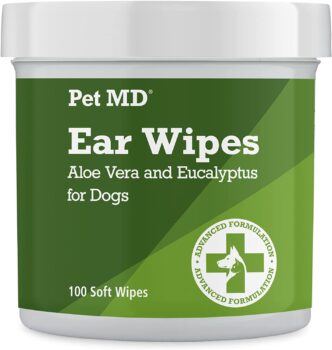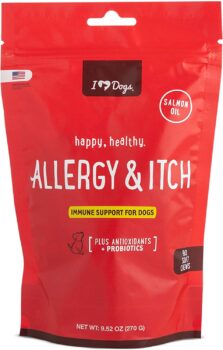As an owner or a prospective owner of a Great Pyrenees, the well-being of your beloved pet is likely your top priority. One of the common health concerns in Great Pyrenees, as well as many other dog breeds, is ear infections. Notorious for their ability to cause discomfort and potentially serious health implications if left untreated, ear infections should be addressed promptly. Below, we offer 11 ways to treat and prevent ear infections in your Great Pyrenees.

iHeartDogs is reader supported. Some of the links below may be paid affiliate links, where we receive a small commission on a product at no additional cost to you.
1. Regular Cleaning
Keeping your Pyrenees’ ears clean is a critical part of infection prevention. Use a vet-recommended ear cleaning solution and gently swab the inside of the ear to remove dirt, debris, and wax build-up.
Our favorite ear cleaner is these PetMD brand ear wipes on Amazon.
2. Dry Ears after Swimming or Bath
Moisture in the ear can create a perfect environment for bacteria and yeast growth. Always thoroughly dry your dog’s ears after swimming or bathing to prevent infection.
3. Regular Vet Check-ups
Regular vet visits can help identify early signs of an ear infection, leading to timely intervention and reducing the risk of complications.
4. Use of Prescribed Medication
If an infection is detected, it’s important to administer prescribed medication diligently. It can include antibiotics, antifungal medication, or steroidal treatments for inflammation.
5. Omega-3 Rich Diet
Incorporating omega-3 fatty acids into your Great Pyrenees’ diet can boost their overall immune system and help fight allergies that may lead to ear infections. Foods rich in Omega-3 include fish, such as salmon and sardines, and flaxseeds.
We’re fans of this Norwegian salmon oil on Amazon. It’s a bright orangish-pink color and has no fishy smell at all due to it’s ultra high purity.
6. Avoid Allergens
Many ear infections are triggered by allergies. Identify potential allergens, such as certain foods, pollen, dust mites, and mold, and keep your Pyrenees away from them.
A few good supplements to help your dog’s allergies are apple cider vinegar, quercetin, and colostrum, all of which are found in many natural allergy supplements like this one.
7. Use of Tick and Flea Control
Parasites can lead to ear infections. Regular use of tick and flea control products can help prevent this.
8. Proper Grooming
Regular grooming, including hair trimming around the ears, can prevent the accumulation of debris that might cause infections.
9. Provide a Balanced Diet
A balanced diet strengthens your dog’s immune system, helping them resist infections.
10. Use of Cotton Balls During Bathing
To prevent water from getting into the ears during a bath, use cotton balls, but remember to remove them afterwards.
11. Keep Ears Warm During Cold Weather
In cold weather, keeping your dog’s ears warm can prevent inflammation that may lead to infection.
The benefits of Omega-3 fatty acids in preventing ear infections cannot be understated. Omega-3’s anti-inflammatory properties can reduce the inflammation in the ear canal that often triggers infections. It also strengthens the immune system, enabling your pet to fight off infections more efficiently.
FAQs on Ear Infections in the Great Pyrenees
- What are the symptoms of ear infections in the Great Pyrenees? Common symptoms include shaking or tilting the head, scratching the ear, redness, swelling, discharge, and foul odor in the ear, and possibly behavioral changes due to discomfort.
- Can ear infections in Great Pyrenees lead to serious health problems? Yes, if left untreated, ear infections can lead to hearing loss, balance issues, or more severe infections.
- How often should I clean my Pyrenees’ ears? Weekly cleaning is often sufficient, but if your dog swims or gets their ears wet frequently, you may need to do it more often.
- Can I use human ear cleaning solutions for my Great Pyrenees? No, it’s crucial to use vet-approved solutions specifically designed for dogs.
- Can a change in diet prevent ear infections? Yes, a balanced diet, including Omega-3 fatty acids, can boost your dog’s immune system and prevent ear infections.
- What are the potential allergens for the Great Pyrenees? Potential allergens include certain foods, pollen, dust mites, mold, and even some fabrics.
- How does Omega-3 help in preventing ear infections? Omega-3 has anti-inflammatory properties, which can reduce inflammation in the ear canal, and it boosts the immune system to help fight off infections.
- Can I use home remedies for ear infections in my Pyrenees? Always consult your vet before using any home remedies. While some can provide relief, they may not treat the underlying cause of the infection.
- Why does my Pyrenees get frequent ear infections? Frequent infections could be due to allergies, weak immune systems, parasites, or the physical structure of the ear.
- Are ear infections contagious to other dogs or humans? Ear infections are usually not contagious unless they’re caused by parasites, like mites, which can be transmitted to other pets.
In conclusion, preventative care is paramount to ward off ear infections in your Great Pyrenees. Regular cleaning, drying, and vet check-ups, along with an Omega-3-rich diet, can do wonders in maintaining your Pyrenees’ ear health. Consult your vet regularly to ensure the wellness and happiness of your furry friend.



 Toledo, United States.
Toledo, United States.